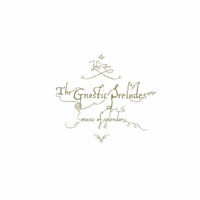Home » Jazz Articles » Extended Analysis » The Band: The Band: Rock of Ages
The Band: The Band: Rock of Ages
Even its name is an enigma—The Band: a collection of four Canadians and one Arkansan, born to back up another Arkansan, Ronnie Hawkins, as "Ronnie Hawkins and the Hawks," then Bob Dylan and then to exist as their own entity—The Band. Five disparate and different individuals who united for a decade, helping define it musically by producing music so much part of the North American collective unconscious as to sound like it had been here all along. The Band —an arrogantly iconoclastic pronouncement on the surface, a bold assumption made with certainty and supported with an unparalleled repertoire. But, then again, an accurate summation.
The Band, at its peak and beyond, was like a musical Norman Rockwell, bad on the whiskey and under the volcano. They effectively painted American Gothic miniatures in their (or largely those of Robbie Robertson) songs, all stories of fertile soil and dry loss, hot summers and wet springs. An agrarian vision from the Nineteenth Century on, full of toil and tears, laughter and pain. This is music that is as humid and earthy as peat, the real roots music, not that anemic brand played today, purloining the same name. Greil Marcus, in his landmark piece of rock criticism, Mystery Train (EP Dutton, 1975) , describes the group's work on Bob Dylan's Basement Tapes (Columbia, 1975) as, ..."a landmark in American vernacular music, in any genre, in anytime, The Band built a room and furnished it in intimacy." Indeed.
The Band made hay while the sun was shining in late 1968 after touring with Ronnie Hawkins from 1960 through 1964 and then, on the most dangerous tour ever, when Bob Dylan went electric in 1966 and '67. Then, in 1968, Music from the Big Pink (Capitol) was released, proving that when one sows the wind, they reap a whirlwind. The Band made the cover of Newsweek with the byline "Country Rock." I don't know about you, gentle reader, but when I think of Country Rock, I think of Poco and the Flying Burrito Brothers, not The Band. No, The Band was purely organic and subatomic-basic American music, basic American themes. "Pink" was followed by the eponymous second recording, the Brown Album that every teenager in 1969 had with "Rag Mama Rag" and "The Night They Drove Old Dixie Down" on it. For kids growing up in my Arkansas home, Levon Helm's voice was at once familiar and scary. A hometown boy makes it big singing about small town things. Can I have an "Amen!."
Stage Fright (Capitol, 1970), Cahoots (Capitol, 1971) and Moondog Matinee (Capitol, 1973) followed, but creative differences and personal problems took their toll and the band began to fragment. But before the rote playing of Northern Lights, Southern Cross (Capitol, 1975), Islands (Capitol, 1977) and the brilliant coda of the Last Waltz (Warner Bros., 1978) , The Band managed to click perfectly live. On New Year's Eve 1971 at the New York Academy of Music, The Band performed with a determined, if resigned, conviction, documenting what they had been trying to define all along—what great American music was. "The Night they Drove Old Dixie Down" is about as far from the majority of American music before and since as can be. And that is a damn good thing.
There are several live testaments of The Band. Aside from Rock of Ages , there is the revelatory Before the Flood (Asylum, 1974) (with Bob Dylan), the most excellent The Last Waltz and Live At Watkins Glen (Capitol, 1995) and most recently, Live at the Academy of Music 1971 (Capitol, 2013, a complete airing of the shows that became Rock of Ages) and Carter Barron Amphitheater, Washington DC, July 17, 1976 (Keyhole, 2014). All testify to the power of The Band live in concert. The original LP release of Rock of Ages is a totally integrated and balanced statement of what The Band was all about and a musical entity. It may be the most perfect live recording in this list.
Rock of Ages addresses several different American archetypes. There is the subject of hard work, with promise ("King Harvest Will Surely Come") and hard work, with avoidance ("Get up Jake"). There is toil and loss (The Night They Drove Old Dixie Down") and fear ("Stage Fright"). Celebration and good times are represented in "The W.S. Walcott Medicine Show," "Across the Great Divide," and "Life Is A Carnival." Even the Biblical is dealt with, perhaps better than any other place in popular music: "Caledonia Mission," "The Weight," "Unfaithful Servant." But these songs, considered individually, are just a snapshot. The Band's play list is really a document, a history, and complete mythology intelligently and sensitively rendered through music.
In popular music, the vehicles delivering the music are often as important as the music delivered. The Band possessed three of the most original and recognizable voices in all of popular music emerging in the 1970s. Richard Manuel's voice is as fragile and desperate as a dying man's prayer. Levon Helm's voice is full of Arkansas Delta grit. Rick Danko's voice pleads with resignation and reconciliation. A fourth voice can be had in Robbie Robertson's instrument and his organic compositions, his aching guitar makes a noise that only a Fender Stratocaster can make. His solo that closes what could have been St. Peter's lament at the cross, "Unfaithful Servant"—pleadingly sung by that third great voice, Rick Danko—is a study in remorseful introspection. This constellation of musical talent and the art they produced are collectively greater than perfect, they is transcends to the sublime.
For the Rock of Ages performances, The Band employed a full horn section with charts conceived by New Orleans legend Allen Toussaint. These horns add and important and not totally expected dimension. They give the music a ("Life's Just a...") carnival feel, making it more authentically and organically American. The horns increase in dramatic effectiveness as the performance closes in on the coda of the recorded recital. On "Dixie," the horns play a mournful introductory lament before the ascending arpeggio of the first verse. Helm's voice, perfectly suited with its combination of Southern elegance and rural dust, delivers Virgil Caine's story with a fatigued and resigned grace. "Chest Fever" is where everything gels completely. Helm, Danko and Maunel click right into place in this most famous shared vocals piece. The horn section, drives The Band into a relentless frenzy that carries over into the most perfect musical expression of the evening "I Don't Want to Hang Up My Rock and Roll Shoes." Again, Helm demonstrates why he is one of the most dominant and memorable voices in rock music.
Disintegrating beneath its own weight, The Band was to fade away to nothing save for some unrealized possibilities and broken promises. But, during the late '60s and early '70s, this group of individuals painted a dynamic Nineteenth Century American still life in song better than any group that came before. It is almost as if they have been here all along, like an ancient part of us in an old black and white photograph going up in flames.
This Wheel's on Fire, Rolling down the Road..."
In 2001, Rock of Ages was dressed up as a Deluxe Edition with some previously unreleased songs, including those belonging to Bob Dylan's appearance (one of his rare ones between 1966 and 1974). The unreleased band material included, "Loving You Is Sweeter than Ever," "I Shall Be Released," The Rumor," "Rockin' Chair," "Time to Kill," and "Don't Ya Tell Henry." In 2013, the entire contents of all of the shows performed December 28-31, 1971 at New York City's Academy of Music, the original concert as mixed and then the soundboard mixes of the other shows. An embarrassment of riches.
The Ten Best Live Rock Recordings
Track Listing
Introduction; Don’t Do I; King Harvest (Has Surely Come); Caledonia Mission; Get Up Jake; The W. S. Walcott Medicine Show; Stage Fright; The Night They Drove Old Dixie Down; Across the Great Divide; This Wheel's on Fire; Rag Mama Rag; The Weight; The Shape I'm In; The Unfaithful Servant; Life Is a Carnival; The Genetic Method; Chest Fever; (I Don't Want to) Hang Up My Rock and Roll Shoes.
Personnel
The Band
band / ensemble / orchestraRick Danko: vocal, bass, violin; Levon Helm: vocal, drums, mandolin; Garth Hudson: organ, piano, accordion, tenor saxophone and soprano saxophone solos; Richard Manuel: vocal, piano, organ, clavinet, drums; Robbie Robertson: guitar, backing vocal; Howard Johnson: tuba, euphonium, baritone saxophone; Snooky Young: trumpet, flugelhorn; Joe Farrell: tenor and soprano saxophones, English horn; Earl McIntyre: trombone; J. D. Parran: alto saxophone and E-flat clarinet.
Album information
Title: The Band: Rock of Ages | Year Released: 2000 | Record Label: Capitol Records
Tags
About The Band
Instrument: Band / ensemble / orchestra
PREVIOUS / NEXT
Support All About Jazz
 All About Jazz has been a pillar of jazz since 1995, championing it as an art form and, more importantly, supporting the musicians who make it. Our enduring commitment has made "AAJ" one of the most culturally important websites of its kind, read by hundreds of thousands of fans, musicians and industry figures every month.
All About Jazz has been a pillar of jazz since 1995, championing it as an art form and, more importantly, supporting the musicians who make it. Our enduring commitment has made "AAJ" one of the most culturally important websites of its kind, read by hundreds of thousands of fans, musicians and industry figures every month.





















